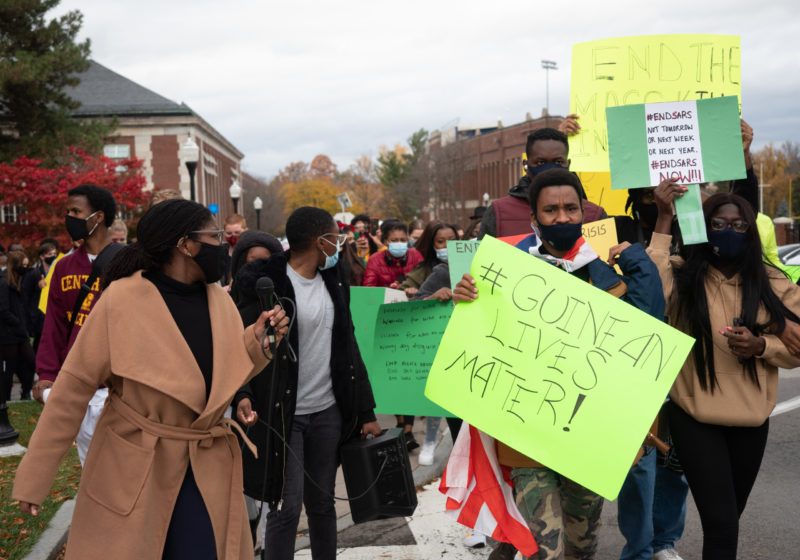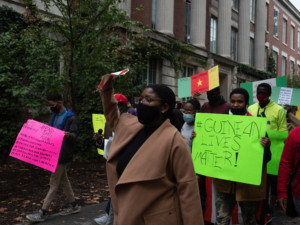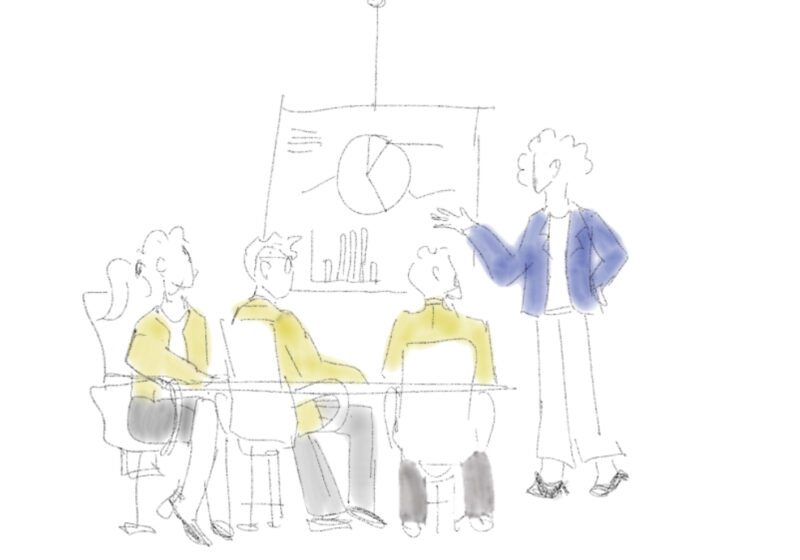Inspired by a surge of injustices and unrest in various African countries, members of the UR community gathered in front of Wilson Commons on Oct. 25 in solidarity with African students to protest and raise awareness about the challenges different countries are facing.
According to one of the hosts, senior and former Campus Times managing editor Efua Kumi, the “Africa is Bleeding” protest was “organically organized by many” of those in attendance. There were various recurring themes in the speeches delivered during the event, with sexual and gender-based violence a pressing concern in several countries.
“[There has been a] 50% increase in sexual violence during lockdown,” sophomore Mohammed Bah said, speaking about Liberia. He said the president had declared rape a national emergency. In South Africa as well, senior Sakhile Ntshangase said the president had declared gender-based violence a national crisis. Ntshangase told the demonstrators that in South Africa “it is estimated that every three hours a woman is killed [and] the women are usually hanged, mutilated, and dumped in bushes.”
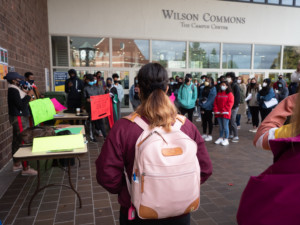
Many students gathered to listen and show support for the Africa is Bleeding protest. Henry Litsky, Photo Editor
Junior Ruth Chiumia talked about increased rape cases in Namibia which have led to hastags like #AmINext, and further criticized the “lax attitude from Namibian law enforcement and government.”
Senior Ejiroghene Davies-Okarevu spoke on EndSARS, highlighting that it wasn’t the first time Nigerians were calling for the disbanding of the Special Anti-Robbery Squad (SARS). “We are not asking for them to abolish the police force, we are asking them to dissolve that unit, stop that unit that’s killing us,” Davies-Okarevu said. “The reason that they were set up is not exactly what they even do anymore. They just target youth that are dressed nicely, [or] youth that they just feel like they want to extort.”
Senior Ayobami Sanusi, who had been targeted by police in Nigeria, urged everyone to “take action.” “It could be any of us, any of our families,” she said.
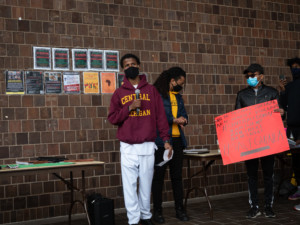
Students talked about various injustices taking place in some African countries. Henry Litsky, Photo Editor
Speakers also raised awareness about election violence in Guinea and the Ivory Coast. For first-year Souleymane Diallo, “[the] Ivory Coast is heading to another bloody crisis.” Sophomore Karl Egbe told of 16 people who died in ethnic fights during his speech. Egbe said the incumbent president “decided to run despite that he promised he’ll not run.” The Ivory Coast held its election on Oct. 31 and is awaiting results. Sophomore Djibril Diallo talked about how the electoral commission in his country of Guinea manipulated the election results and orchestrated an internet shutdown, which prevents issues from the country from gaining global attention.
Senior Saffie Kaiwa described the Cameroon anglophone crisis and said that the day before the Africa is Bleeding event, eight kids were shot and killed in Cameroon.
“That’s why we are here,” Kaiwa said. “For us to amplify those voices, so please […] join us and stay informed.”
Junior Mauricio Coombs concurred, urging demonstrators to use resources at their disposal to educate themselves, such as taking classes or doing a cluster in African and African-American Studies.
Coombs asked demonstrators to raise a hand if they owned a phone or laptop. He talked about the illegal mining of cobalt in Congo which he said is then smuggled to other countries and sold to large corporations who use it in making phones. “Poor […] Black people, women and children are raped and forced into slave labor,” Coombs said, explaining to demonstrators where their phones come from.
Coombs pointed out that there has been no action from the United Nations.
“For your silence, justice will come for you,” said another demonstrator to loud cheers, referring to the African Union, United Nations, and other intergovernmental organizations that have been silent on the ongoing issues.
Resounding chants of “No Congo, No Phones,” “Black Lives Matter,” “Am I Next,” “EndSARS,” “Free Congo,” “End Anglophone Crisis,” “Buhari Must Go,” “End Colonialism,” and “Africa for the Africans” echoed around campus as demonstrators marched from the Wilson Commons porch to Douglass Leadership House.
According to senior Adebimpe Isafiade, the demonstration was a good way to raise awareness, and she encouraged attendees to contact the media, state legislators, educate themselves, and donate if they’re able.
“The most powerful tool to change the world is our voice,” Bah said. “We must unite and fight together for a just society.”
